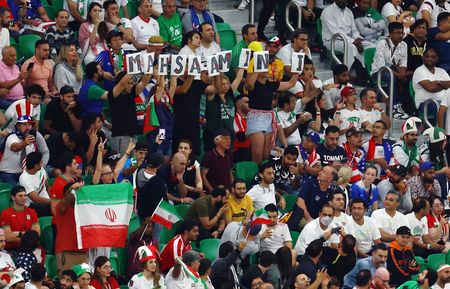By Andrew Mills
DOHA (Reuters) -The United States triumphed on the pitch over longtime political adversary Iran on Tuesday in a World Cup match overshadowed by protests raging in Iran and laced with decades of tension between the two countries.
The contest in Qatar between the two nations, which severed diplomatic ties more than 40 years ago, took place under increased security to prevent a flare-up over the anti-government protests across Iran since the death in custody of 22-year-old Kurdish woman Mahsa Amini on Sept. 16.
Qatar, which has strong ties with Washington and friendly relations with Tehran, has staked its reputation on delivering a smooth World Cup, beefing up security at Iran games and banning some items deemed inflammatory, such as Iran’s pre-1979 Islamic revolution flag.
U.S.-Iranian tensions have worsened since 2018 when then-President Donald Trump abandoned an international nuclear deal with Iran. Attempts by President Joe Biden’s administration to revive the 2015 accord have stalled.
U.S. Secretary of State Antony Blinken, speaking in Romania, played down any link between the match and political tensions and said he hoped the game would “speak for itself”, adding that he would be watching and cheering on his country.
In sporting terms, the 1-0 win for the United States after a first half goal by Christian Pulisic means they progress to the knockout stage, while Iran are out of the competition.
Despite qualification out of Group B being on the line and the geopolitical background, the match was mostly cleanly played with no hard fouls or altercations between the players. When the nations last played in the 1998 World Cup, Iran won 2-1.
For fans attending the first soccer World Cup in the Middle East, or watching across the world, Iran’s domestic politics and its troubled relations with the United States were in focus.
STADIUM PROTESTS
Extra security personnel, some mounted on horseback, patrolled outside the Al Thumama Stadium in Doha before the match while guards at the perimeter made Iranians unfurl their flags before entering. Police were stationed throughout the stadium alongside regular security guards. Some carried batons.
Early in the second half, a group of fans briefly held up letters spelling Mahsa Amini’s name, to applause from Iranian supporters around them. Security personnel took their signs but allowed them to remain in their seats.
A Qatari official said before the match that authorities would ensure all matches were “safe and welcoming for all spectators”. Items that “could increase tensions and risk the safety of fans” would not be permitted.
Gulf Arab monarchies, including Qatar, do not tolerate domestic dissent and protests are rare in the region.
Outside the stadium after the match, Reuters journalists saw stadium security chase two people in a series of scuffles on the stadium’s perimeter.
Three guards pinned one man to the ground, who was wearing a t-shirt emblazoned with the words “Women, Life, Freedom,” the central slogan of the Iranian protest movement.
The man repeatedly yelled, “women, life, freedom” as guards were on top of him. An eyewitness told Reuters the altercation began when guards attempted to remove the man’s shirt.
In the other incident, guards chased a man through the stadium area and pushed him back inside.
Tournament security officials and tournament organisers, the Supreme Committee for Delivery and Legacy, did not immediately respond to Reuters’ request for comment.
‘NOT MY TEAM’
In the second half of the match, five members of the Russian activist punk group Pussy Riot stood in the stadium stands wearing green balaclavas and t-shirts that read “Woman Life Freedom.” On the back, the shirts carried the names of people killed in Iran, along with their ages, Nika Nikulshina, a group member told Reuters.
“It’s our gesture of support for Iranian women and we want to highlight that Iran is sending drones to Russia to kill Ukraine. We want to remind everyone that there is not only FIFA and fun, and that there’s a war going on,” she said.
Stadium security removed the balaclavas and, after the match, “politely” escorted the women out of the stadium, said Nikulshina, who invaded the pitch in 2018 during the World Cup Final in Moscow.
Before kick-off, some fans outside the stadium sought to highlight the protests and the Iranian government’s crackdown.
“Everybody should know about this. We don’t have voice in Iran,” said an Iranian living in the United States who gave his name only as Sam.
Speaking by phone from Tehran shortly before kick-off, 21-year-old Elham said she wanted the United States to win because victory for the national squad, known as Team Melli, would be a gift for Iranian authorities.
“This is not my national team. It is not the Melli team, it is the mullahs’ team,” she said.
Under pressure to publicly support protesters at home, the Iranian team declined to sing the national anthem in their first game against England, which they lost 6-2. But they sang it before the second game, a 2-0 victory over Wales, and again on Tuesday.
The protests in Iran pose one of the boldest challenges to the theocracy.
After the Americans won on Tuesday people were chanting “Woman, Life, Freedom” and “Thank you the U.S. team” from rooftops, two sources in Tehran’s Velenjak neighbourhood told Reuters.
(Addional reporting by Maya Gebeily, Parisa Hafezi and Elwely Elwelly; Writing by Ghaida Ghantous, Dominic Evans, Amy Tennery and Rory Carroll; Editing by Mark Heinrich, Rosalba O’Brien and Grant McCool)





